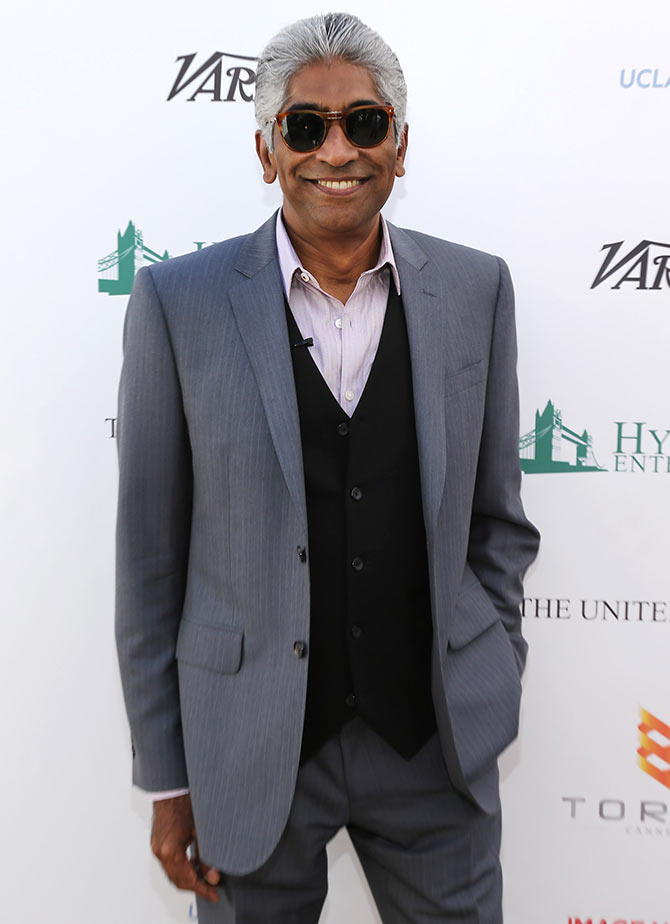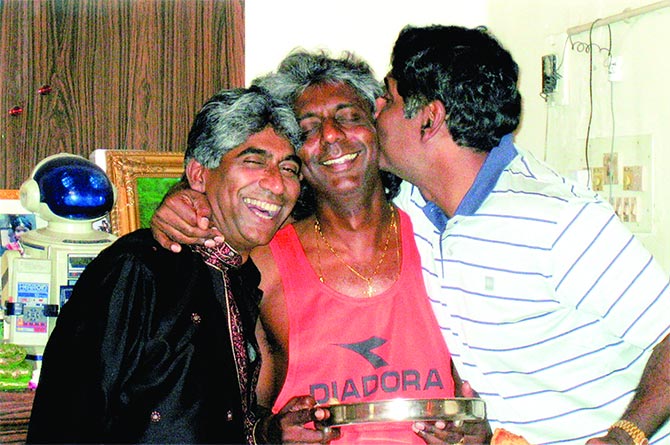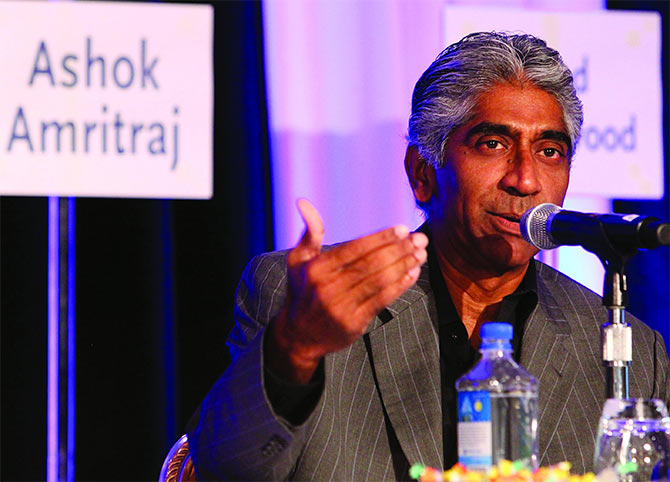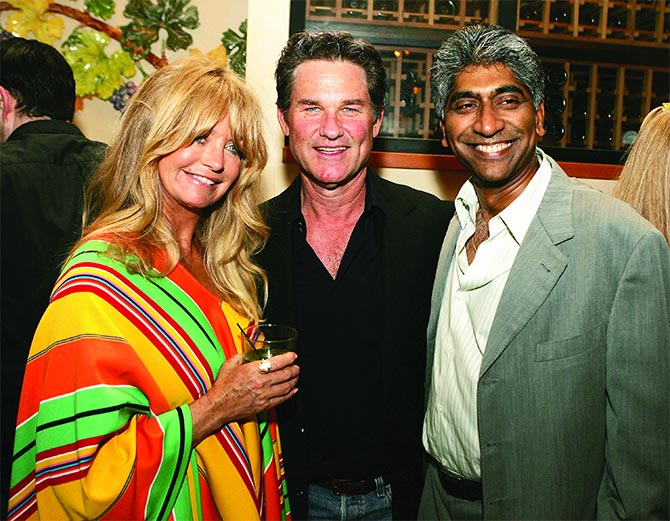 | « Back to article | Print this article |
Ashok Amritraj: The Madras Mogul
Movie producer Ashok Amritraj maps out his American Journey in this conversation with Arthur J Pais.
Maggie Amritraj encouraged her sons Anand, Vijay and Ashok to set their goals very high, and with her husband Robert, she admired them when they played at tennis tournaments like Wimbledon and the US Open. For some time, it looked she was comfortable when her sons decided to settle down in America.
When her youngest child, Ashok, ventured into movie production and continued to struggle for many years, Mrs Amritraj wanted him back in India. She was a strong-minded businesswoman and had moved from a small business in her garage in Chennai to a big time operation. She urged Ashok to return and join her in the business.
Ashok Amritraj confesses he was tempted to go home, but he decided to stay back in America.
He has gone on to produce and co-produce over 120 films featuring many big Hollywood stars including Dustin Hoffman and Jake Gyellenhall (Moonlight Mile), Bruce Willis and Cate Blanchett (Bandits) and Sandra Bullock (Premonition).
A handful of films with him as a producer have been shown at the Toronto International Film Festival.
With over four decades in Hollywood, and a challenging career as a filmmaker who spends many hours a week on philanthropic activities and looking at projects by up and coming filmmakers, the youngest Amritraj recently published his autobiography Advantage Hollywood in India.
In a few months, his film Life of Crime, a comedic crime drama based on an Elmore Leonard novel, will be out with Jennifer Aniston in the lead. It was one of the more popular films in Toronto last year. It will be followed by the off-beat, art house-bound 99 Homes. A father struggles to get back the home that his family was evicted from by working for the greedy real estate broker who is the source of his frustration in 99 Homes directed by Ramin Bahrani (Man Shop Cart, Chop Shop).
Ashok Amritraj has also announced Christ the Lord: Out of Egypt, the story of the early years of Jesus Christ as seen through the eyes of a child, based on Anne Rice’s bestseller.
Why didn’t you return to India when your mother called you back?
I was too much in love with the movies. I wanted to sweat it out for a few more years. I figured out it would be a matter of a few years. I knew I could not go back to tennis. It is not the kind of game that you can return to after having stayed out of it for several years.
Please click Next to see more.
'My parents were not enthusiastic about my decision to do movie business'
What were your early years in Hollywood like?
My brothers and I played at Wimbledon throughout the 1970s. The international press may have seen us as an unusually gifted family, but the Indian newspapers adopted us as their darlings, their champions and heroes. We were photographed, written about, interviewed. Our past records were noted and our futures speculated about.
But I was thinking of another world, the world of movies, which had fascinated and enthralled me from my childhood.
How was I to remain or make a life in America? I knew nothing about films or the industry. I was a tennis player and that was my only profession.
My parents were not enthusiastic about the decision. Their attitude was simple. What had our family got to do with the movie business? Apart from the fact that my father had once, after performing in a college play, been offered a role and perhaps a career by one of South India’s leading movie producers, we had no connection with film or stage.
I had long discussions with Vijay who was very keen on being an actor, but his tennis career was going so well he did not have enough time for acting. (Vijay Amritraj played a part in the Roger Moore as James Bond film set mostly in India, Octopussy.)
I decided to take the plunge. The challenge, the possibility, the decision to break away from what I knew, and from what I had a future in, and enter the unknown was with me night and day.
Tennis was certainly an easy way of being introduced on intimate terms to celebrities and studio executives, and I was naive to think those introductions would lead (me) into the movies.
The executives and moguls who played (tennis) with me naturally thought of me as the tennis player, and not ‘a player.’ I remember I had sent a script to a producer at whose house I also played tennis.
When I called him up a few days later he spent about 15 minutes on the phone with me, but most of the time (he) spent discussing his back hand and his second serve, and advice he needed to make it better. As the call was winding down, I quickly asked, ‘What did you think of the script I gave you?’
‘The script? What ...oh the script? Yeah, no we passed on that weeks ago.’
Some people did not know what to do with me because I was from India. Mind you, this was at a time there was hardly a producer from India in Hollywood.
I was chatting one day with a studio boss, who had a modest American school and college education. When he asked me where I came from and when I said India, he responded, ‘Oh yes, of course! I’ve always loved Singapore. By the way, in which part of India is Singapore?’
Finally, in 1984, Vijay and I raised a little money from some Indian friends, half a million dollars to be exact, and we produced a film called Fear in a Handful of Dust. It was based on a novel by Brian Garfield. Brian had come to fame by writing Death Wish, the Charles Bronson movie. We made the film on a small budget and we were able to recover our investment.
In 1985 I met the legendary Roger Corman who had made many small budget films, many of them horror films, but they had launched the careers of many directors who would join the A-list.
Roger, as writer, director, producer or executive producer, made more than 350 movies and never lost a dime. In most cases his films were pre-sold. It sounds like common sense and elementary logic, but Hollywood costs and sales are not arithmetic; they are more of complex algebra, with a touch of wizardry. I learned quite a lot from Roger.
The big lesson in my life has been something that I learned growing up in Chennai. The great Tamil poet Thiruvalluvar wrote:
To listen, learn and realize
The truth from whatever source
Is the mark of the Wise.
I have offered that wisdom to my children.
Even though I was struggling and had yet to produce a hit film, I took another plunge, I decided to marry, and in India, and a woman from the short list made by mother!
'Indian mother is a more effective mating agency than anyone else or a matrimonial site'
You dated quite a few Americans. Why didn’t you marry one of them?
Had I married a few years before I actually married (in 1991), I might have gone for an American. But as I as growing older, I was appreciating more and more my Indian heritage and roots, and that clinched my decision.
I was in a serious involvement and friendship which had lasted years in LA. She was some years older than me and an award-winning TV actor. I can honestly say that I learnt a lot from that relationship, about life and about what human beings want and can get from each other. But we ended the relationship amicably because we realised it was not going to work out for us.
Why did you ask your mother to help you to find a wife?
I thought that your best friend can always help you, and my mother happened to be my best friend.
I also thought that an Indian mother is a more effective mating agency than anyone else or a matrimonial site. By that time, I had spent almost 15 years in the West. I had visited India and spent working and holiday periods there. But my home, or at any rate the house I call my own, was in LA.
As I write in my book, Advantage Hollywood, I had discovered that loneliness and nostalgia are fast friends. This desire for a life companion was tied with being Indian, being South Indian, being Tamil, being Catholic and coming from the sort of family from which I came and which I missed.
The assumptions, the comforts of a shared culture, the ambitions for the future and patterns of development of a family -- all these were part of my request to my mother.
I was then producing low budget films, some for the video market, some for the theaters and one film paid for the next. I had not yet broken into the big league. I was honest with myself, as so many other people drawn to Hollywood are not.
I also knew that I was within the networking circle of Los Angeles and I might have to wait for some more time being seated at the table. People like Sidney Poitier and Charlton Heston whom I had befriended and shared my passion for tennis encouraged me to stay and fight to make the kind of films I wanted.
What were some of the crucial lessons you learned early on in Hollywood?
I was making a small budget film then called Light in the Jungle based on the life of Albert Schweitzer, the legendary doctor who had worked with the poorest in Africa. Malcolm McDowell who had starred in such films as If as well as A Clockwork Orange, was playing the title role. He was a seasoned actor, but for a crucial shot for the film we ran into serious problems. I learnt one of my first big life lessons and that was a director and an actor often clashed.
Gray Hofmeyr, the director from South Africa, did not see eye-to-eye with the British-born McDowell. For one scene, Gray asked McDowell to hold a live frog and smile at it. Malcolm said he was not doing that. We have a picture of a young director sitting with his head in his hands.
Gray came from another world and I could understand the clash because I was familiar with the melodrama of Indian films. Gray wanted to create some melodrama, some sentimentality, but Malcolm could not understand it. He did the scene, but it did not come out well and you will not find it in the film.
'My wife Chitra brought us luck'
How did your breakthrough film happen?
I was in Cannes when a young man who looked familiar came up to me and said ‘Do you remember me?’ He told me a few years ago, he had sent me a letter. In fact, he added he had sent 800 letters with his photograph to producers in Hollywood and New York, but I was the only one who had replied.
‘I am Jean Claude Van Damme,’ he said.
Though I could not offer him a role when he wrote to me I must have said something encouraging to him. He told me at Cannes he was an actor on the way to becoming a star. He also said he drove limos to supplement his income. Soon we shook hands agreeing to make a movie together.
This was the film, Double Impact, my first big budget film, then costing about $11 million. It had a lot of action, thrills and sentiments. It made over $150 million worldwide. At the end of the shoot, Van Damme gave me a signed photo showing us in a seemingly ridiculous off moment between the shoot.
That film came after you got married, right?
I have said to my wife Chitra she brought us luck. But marrying Chitra did not happen all of a sudden.
None of the girls that my mother had short-listed for me to check out worked out for me. They had everything to recommend them. But I was looking for that extra spark. I was doing the pre-production of Double Impact and I decided to go back to India to meet some more prospective brides.
I called my partners at Columbia Pictures and told them I was off to India and I was going to meet my prospective bride. “That’s wonderful!” they said. “How long have you known her?”
“I have not met her,” I said.
I was about to give up my search when my mother said that I should meet at least one more person. And this happened to be Chitra, daughter of a well-known sculptor, but came from a different background than what I wanted.
Her mother was a Syrian Christian from Kerala and her father was a Tamil Hindu. But after taking her out several times, and feeling that Chitra could be my life partner, I proposed to her.
'I have made films with A-list artists and directors for costs far less than the standard'
You began your film business partnering with your brother Vijay, but soon you were making films on your own…
That was mainly because whatever time Vijay had outside tennis, he wanted to devote to his acting career. But we remain close. In fact, all three Amritraj brothers and their spouses are close to each other.
What were some of the reasons for your success as a producer?
Very early on, thanks to my mother’s business instincts and my Indian background, I realised the importance of keeping the costs down on a film.
Even today, I can make a film for about $10 million less than the budget of someone else.
When Ghost Rider: The Spirit of Vengeance, with Nicholas Cage, was under development, the budget was around $75 million. I chose a different location for the film. We shot it in Romania and brought the cost down to something like $57 million. The movie made about $150 million worldwide and was a hit. With the original budget, it would have just recovered the budget.
In the second decade of my career, I found out that many actors had certain pet projects in their heart, but the big studios were afraid to make them. I made those films, cutting down the budget by making the star eligible for a cut from the box office. These backend deals brought down the production costs considerably.
One such film was Shopgirl, based on Steve Martin’s bitter sweet novella about the vagaries of love, passion and possession. Steve was in the lead in my hit film Bringing Down the House. Shopgirl was going to be a much smaller film, and by making him a partner we were able to do so.
I have made films with A-list artists and directors for costs far less than the standard. These films include Moonlight Mile with Oscar winners Dustin Hoffman and Susan Sarandon, with up and coming star Jake Gyllenhaal.
I have made films with many popular artists like Goldie Hawn (Raising Helen) for reasonable costs. Premonition, one of my biggest hits, had Sandra Bullock who was big then, four years ago, as she is now. And yet we were able to make it for about $25 million.
Life of Crime would not have been made for about $15 million, but for the fact that Jennifer Aniston, who is much in demand (her last hit We’re the Millers grossed about $225 million worldwide), reduced her fee considerably and came on board as a producer along with Elmore Leonard who died as we were completing the film.
Though I make market-oriented films, from time to time I have backed off-beat and risky films. One of them was Battle in Seattle unfolding with the protests against WTO in Seattle. I also executive produced The City of Your Final Destination based on a Ruth Prawer Jhabvala screenplay and directed by James Ivory for Merchant Ivory.
Though the film’s commercial aspects were very low, I got involved remembering the quality films Merchant Ivory had made over the years and though Ismail Merchant was no more around us, I thought the film should be released in his memory.




